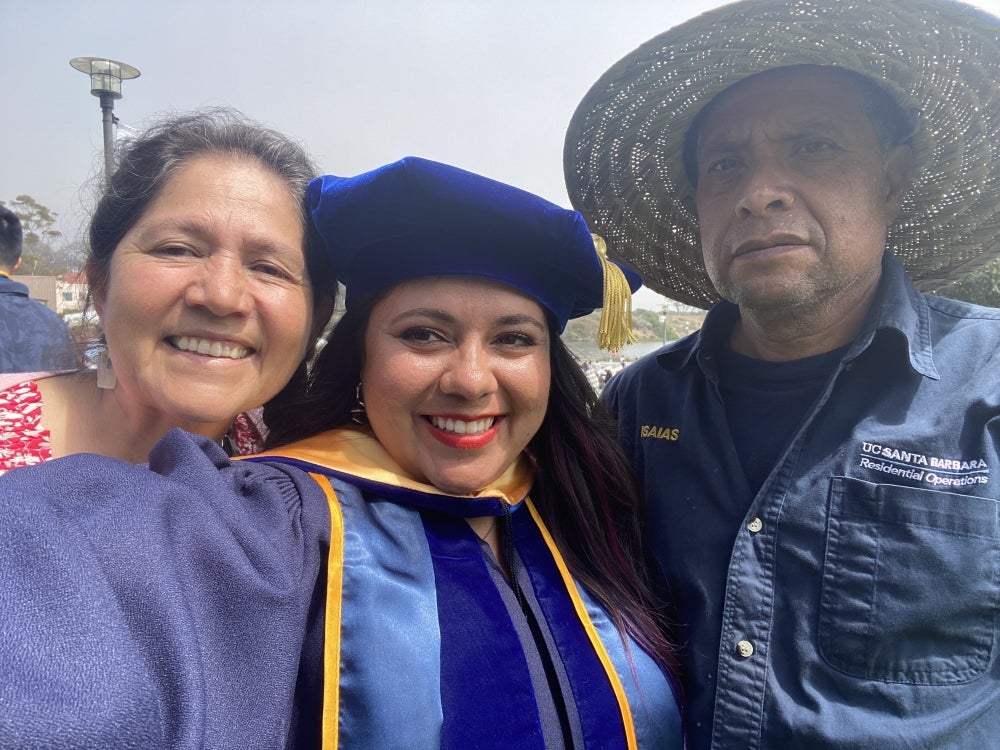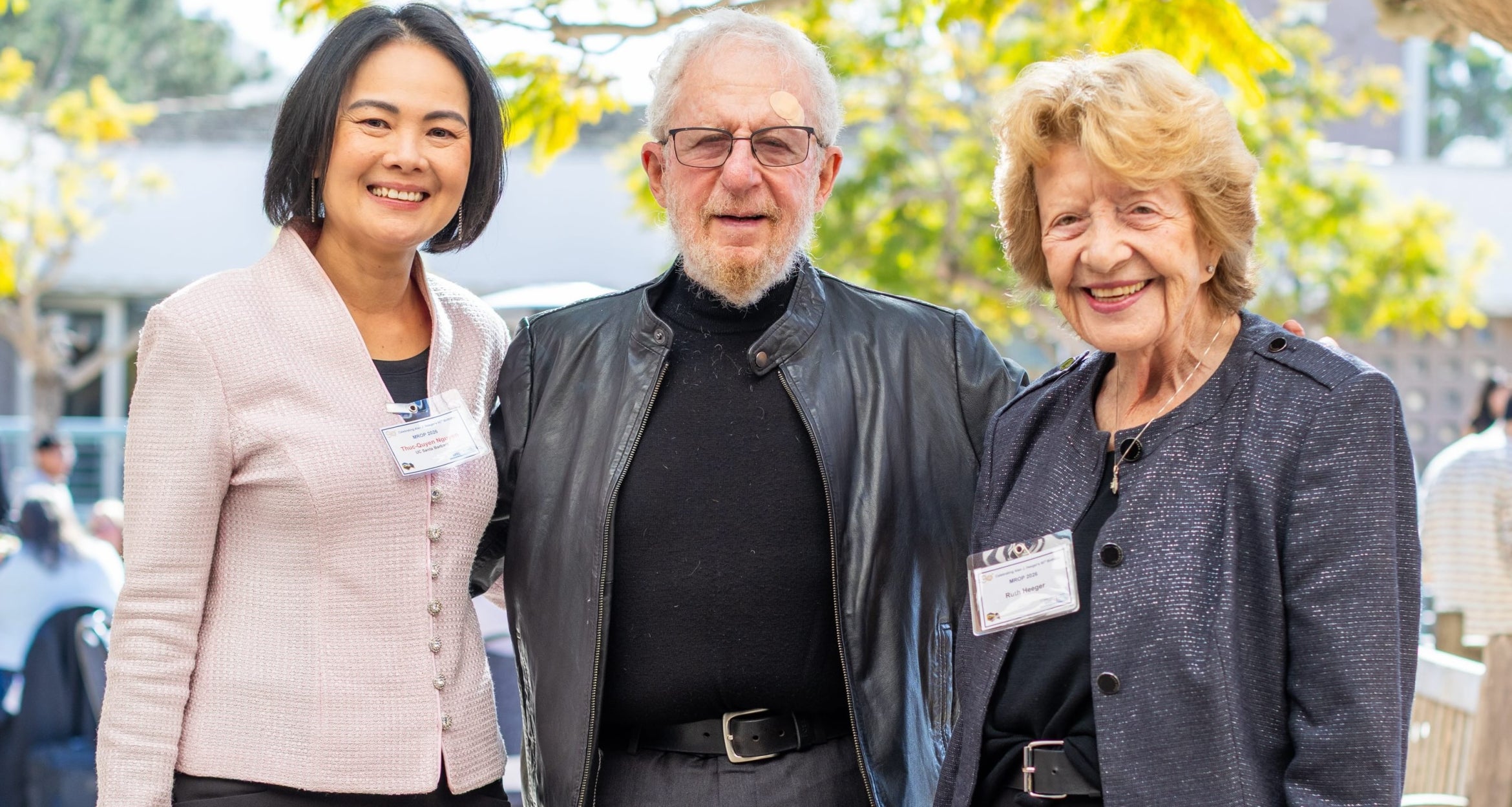
First-Gen Resilience
Ana Guerrero still remembers an early childhood spent living in a trailer with her parents and two siblings out on a ranch in Goleta, a pastoral, coastal area at the southern entry to central California. Originally from Mexico, she and her family, like many immigrants to this country, took a shot at the American Dream, with its promise of a better life through hard work.
“My parents worked for the owners of the ranch and I had a very rural upbringing,” she recalled. Attending a small school and living five to a two-person trailer, she and her family made incremental progress.
Although she was studious and hardworking — values instilled in her by her parents — for Guerrero, college just wasn’t part of the plan. It may as well have been another world, as far as she was concerned.
First Exposure
“Although we were in the backyard of UC Santa Barbara, we did not have a lot of exposure to college life,” she remembered. “What was a college student? How do you become a college student? We never developed a college-going identity.”
That is, until her senior year at Dos Pueblos High School, when she was part of the ENLACE outreach program. Targeted toward Latino high school students, ENLACE sought to demystify the college entry process with mentors who serve as models for the younger students, urging them to embrace the possibility of attaining higher education and helping them navigate the often byzantine process. For Guerrero, one such model was Sugely Chaidez, a Latina Ph.D. student conducting research on the program’s participants.
“She was so influential for me,” Guerrero said. Yet Guerrero still did not feel mentally prepared for college, having only made her decision to go during her senior year. “It was too late,” she said. “And I was too scared.”
She started at Santa Barbara City College, along with her friends and older brother. And because she had already done the work of applying to university through ENLACE, college admissions weren’t the obstacle course for her the next time around. Guerrero got into and transferred to UC Berkeley.
Fast-forward several years, and with bachelor’s degree in hand, she returned to Santa Barbara and started working at City College. Not knowing what her next steps should be, Guerrero had a conversation with her supervisor, who had attained a doctorate from UCSB’s Gevirtz School of Education. Her supervisor encouraged Guerrero to shoot for a Ph.D., too.
“No way, I could not be a Ph.D. student,” she remembered thinking. “I had a bachelor’s degree and that was as far as I saw myself getting.”
Two Good Men
“My supervisor said ‘If I can do it, you can do it. Go talk to this professor,’” Guerrero recalled.
What started as an appointment for Guerrero’s fact-finding mission turned out to be a full circle: ‘This professor’ was none other than Professor Richard Durán, Sugely Chaidez’s doctoral adviser and principal investigator of the ENLACE Program.
“We were both really excited,” Guerrero said. It was a validation for them both of the power of college outreach programs for Latinx youth. Durán took her on as a Ph.D. student, mentoring her as she pursued an advanced education.
Guerrero would encounter her other champion in various places around campus.
“At first it was like whoa, like a shock,” she said, encountering this man in his work clothes and wide-brimmed hat, often hunched over the ground while she was hustling to class or work on campus. “I was just randomly running into my dad.” The interactions were brief, she recalled; both in their work environments. Her father is part of the campus grounds team.
“It would be very casual,” she said, “but there was something deeper because having those short conversations with my dad was a burst of motivation and energy for me. And I felt confident because I knew that I was representing the voices of so many in my community, including my family, my dad, who does a lot of labor for the institution.
“Seeing him work and knowing he had done so much for me, it made me feel like I can work that hard too,” Guerrero added. “I’m not going to lie; it’s hard. But thanks to that foundation my parents laid out for me, I felt like I had to take full advantage of the opportunity.”
“Me sentía con el compromiso y la responsibilidad de apoyarla en todo,” her father said. “Para que lograra terminar sus estudios.” (I felt the commitment and responsibility to support her in everything, so she could finish her studies.)
In addition to the random run-ins, Ana and Isaias Guerrero would make it a point to get together on campus for various reasons throughout her journey to her doctorate, from birthdays to labor demonstrations to staff appreciation days.
Six and a half years from her start at the Gevirtz Graduate School of Education, she earned her Ph.D., a feat unimaginable to her not so long ago. But there was just one more hurdle: COVID-19, which at the time was sweeping the globe and in-person events, including graduations, had been eliminated. Fortunately, those who had been prevented from marching by the pandemic were welcomed to UCSB’s 2022 commencement ceremonies. And so Dr. Ana Guerrero, in full regalia and with all the pomp and circumstance due to her massive achievement, took part in her doctoral hooding ceremony as her proud parents looked on.
“Bueno, al verte allá arriba, escuchar tu nombre, sentí ganas de llorar, en mi mente se recorrió muchas memorias de cómo trabajaste tan duro día y noche. Nunca te rendiste, nada te detuvo,” her mother Patricia said to her. “Lo lograste mi niña allí estás ahora! Con un doctorado!” (Well, seeing you up there and hearing your name, I felt like crying. In my mind I remembered many memories of how hard you worked day and night. You never gave up and nothing stopped you. I was left with lots of pride and joy. You did it, my girl, here you are now! With a doctorate!)
Guerrero has not skipped a beat since receiving her degree. In addition to working as a program administrator for a doctoral program, she devotes her time and effort to advocating for first-generation college students with FirstGen_Resilience, a platform she founded.
“My mission is to motivate others and provide guidance, resources, empowerment — the things I wish I knew while navigating college,” she said.
And to those who may want to attend graduate school but worry they can’t handle it, Guerrero has this to say:
“Many times we don’t take chances because we may not believe in our abilities, but I would say that you don’t need to have it all figured out. You just need to be open to learning along the way, making mistakes and reaching out.
“You don’t need to go in knowing everything, but that’s why you’re a student, and that’s why there are instructors to guide you. I know it’s very intimidating, especially if no one in your family has ever been to college, but there are resources and people who want to help. It’s a matter of trusting yourself and your abilities.”



